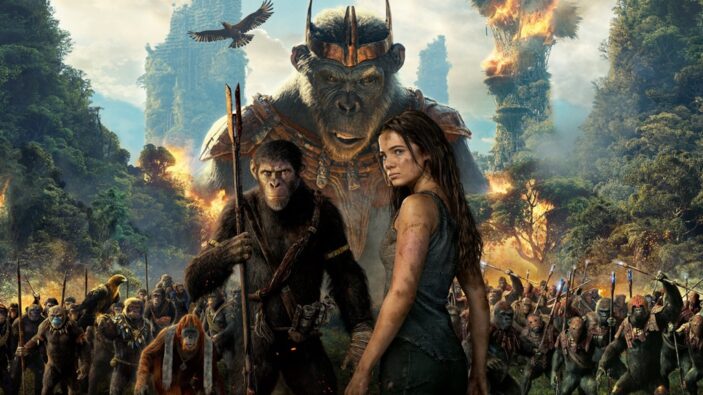
Although Kingdom of the Planet of the Apes is a continuation of the rebooted Planet of the Apes trilogy that Rupert Wyatt’s Rise of the Planet of the Apes kicked off in 2011, with Matt Reeves’ Dawn of the Planet of the Apes (2014) and War for the Planet of the Apes (2017) following through, Wes Ball‘s lengthy, involving sequel (of sorts) very much stands on its own, with Josh Friedman‘s script incorporating enough of the previous films’ lore to assist in fresh eyes watching this without feeling lost.
This trilogy centred around Caesar (motion-captured by Andy Serkis), an ape raised by human, who was the only of his kind to see the good in humanity. The apes’ intelligence rose from a man-made virus that signalled our downfall, and Caesar proved the beacon of light both humans and the apes needed in a bid for co-existence. We may not have believed we were worth saving, but Caesar sure did, and it’s his legacy that shines through the core of Kingdom….
This film picks up centuries later, where the memory of Caesar is close to becoming extinct, and the apes are living in tribe-based societies, harmonious with one another and the land itself, which has reverted to an Earth of lush forestry and jungle. The young Noa (Owen Teague) proves our focal point, with his reckless behaviour opening the film as he and his besties, Soona (Lydia Peckham) and Anaya (Aussie Travis Jeffrey), swing and climb to the highest nest to retrieve an eagle’s egg – a coming-of-age ritual within their individual tribe.
This sequence alone speaks to both Ball’s exciting, immersive direction and the flawless ape design that so much of the film relies on. The freedom and purity of this opening sequence, and the following moments of Noa’s tribe – including his interaction with his father (Neil Sandilands) – are short-lived though, as an opposing tribe under the dictatorship of Proximus Caesar (Kevin Durand) rip through them, slaughtering any and all in their path.
Proximus Caesar, despite his name, is not a figure inspired by Caesar’s legacy, but rather the warfare of humans. His actions ultimately lean into the apes own doom of repeating the human race’s own mistakes, but he sees such actions as necessary in his determination for domination. We all know how this is likely to end for Proximus Caesar and his followers, but Ball delights in the emotional slow burn of Noa – who survives the aforementioned slaughtering and takes up with wise, peace-wanting Raka (Peter Macon) and a seeming sole roaming human (Freya Allan), who they name Nova – and his eventual uprise.
The ideas put forth here by Proximus Casear’s tyrannical mentality and the uncertain future of the relationship between ape and human is something Kingdom… no doubt hopes to expand upon in future sequels as, despite this acting as its own entity, there’s a certain temperament at bay that suggests this is the start of a new trilogy of stories. And given the quality on hand here, this world here absolutely deserves further exploration.
With the quality of the most recent trilogy conditioning us as to how involved, impressive and intricate these films can be, Kingdom… effortlessly slips into the fold with technical marvel and an emotional resonance. Some audiences may be unprepared for the film’s deliberate pacing and reliance on story over spectacle – though, don’t get me wrong, this film has some glorious set pieces – but as a prime example of how blockbuster filmmaking doesn’t have to solely fall back on extravagance to entertain, this is one Kingdom worth entering.
![]()
![]()
![]()
![]()
![]()
FOUR STARS (OUT OF FIVE)
Kingdom of the Planet of the Apes is now screening in Australian theatres.
